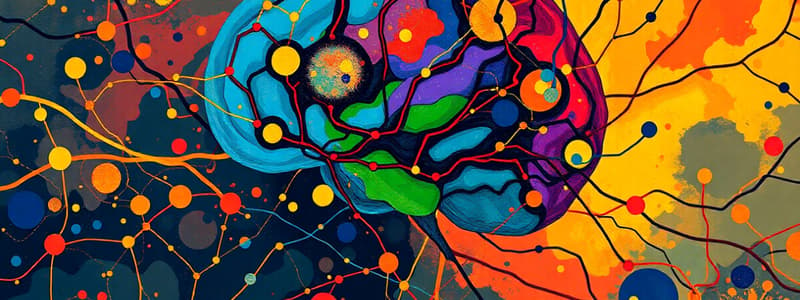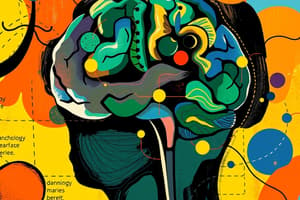Podcast
Questions and Answers
Cognitive ______ refers to the branch of psychology dedicated to studying the mind.
Cognitive ______ refers to the branch of psychology dedicated to studying the mind.
Psychology
______ posits that specific functions are processed through specific areas of the brain.
______ posits that specific functions are processed through specific areas of the brain.
Localization
According to ______ processing, lower levels of the brain are analyzed first, then passed up to higher levels.
According to ______ processing, lower levels of the brain are analyzed first, then passed up to higher levels.
hierarchical
Distributed ______ suggests that specific functions are processed by many different areas of the brain.
Distributed ______ suggests that specific functions are processed by many different areas of the brain.
The neurons are able to communicate through ______ and neurotransmitters.
The neurons are able to communicate through ______ and neurotransmitters.
Neural ______ are networks of artificial neurons, units, or nodes in a computer program designed to mimic the properties of real neurons.
Neural ______ are networks of artificial neurons, units, or nodes in a computer program designed to mimic the properties of real neurons.
______ involves the stages between sensation and perception.
______ involves the stages between sensation and perception.
______ is the process by which elements that occur together are seen as belonging together.
______ is the process by which elements that occur together are seen as belonging together.
______ processing involves starting with higher level knowledge to shape perception.
______ processing involves starting with higher level knowledge to shape perception.
Bottom-up ______ involves perception that starts with the stimuli themselves.
Bottom-up ______ involves perception that starts with the stimuli themselves.
Flashcards
Cognitive Psychology
Cognitive Psychology
The study of mental processes such as perception, memory, and reasoning.
Cognitive Neuroscience
Cognitive Neuroscience
The branch of psychology that studies the relationship between the brain and cognitive processes.
Neurons
Neurons
Basic building blocks of the nervous system that transmit information through electrical and chemical signals.
Hierarchical Processing
Hierarchical Processing
Signup and view all the flashcards
Localized Representation
Localized Representation
Signup and view all the flashcards
Distributed Representation
Distributed Representation
Signup and view all the flashcards
Neural Networks
Neural Networks
Signup and view all the flashcards
Perception
Perception
Signup and view all the flashcards
Cognitive Processes
Cognitive Processes
Signup and view all the flashcards
Study of the Mind
Study of the Mind
Signup and view all the flashcards
Study Notes
Overview of Cognitive Psychology
- Cognitive psychology studies the mental processes enabling human function, essentially studying the mind.
- Early 1800s/early 1900s saw initial attempts to study the mind, including psychophysics (Fechner, Weber), structuralism (Wundt), introspection (Wundt), simple and choice reaction times (RTs) (Donders), forgetting and savings curves (Ebbinghaus), and early psychology texts (James).
- Early-to-mid 1900s introduced behaviorism, focusing on observable and verifiable behavior (Pavlov, classical conditioning; Watson, Skinner, instrumental learning/operant conditioning).
- Later, researchers shifted focus (Tolman, cognitive maps; Thorndike, trial-and-error learning) to link behavior to unseen goals.
- The 1950s and 1960s marked the start of cognitive psychology as a field, prompted by the introduction of computers.
- The field expanded from the 1970s onward, incorporating EEG and brain imaging technologies (PET, fMRI).
Studying the Mind
- Cognitive psychology is the scientific study of the mind's workings.
- Key cognitive processes include sensation, perception, attention, learning, memory, language, problem-solving, reasoning, and decision-making.
- Early efforts to study the mind include those by Fechner (1854).
Early Efforts to Study the Mind
- Broca (1861) linked specific brain areas with specific functions (Broca's area).
- Donders (1868) measured reaction times to understand cognitive processes.
- Wundt (1879) established the first psychology lab focused on structuralism.
- Ebbinghaus (1885) studied memory through self-experimentation.
- James (1890) wrote the first synthesis of psychology ("Principles of Psychology"), influencing functionalism.
- Fechner (1830s–1860s) pioneered psychophysics.
Linking Mind and Brain
- Broca linked language production to a specific brain area.
- Paul Broca (1840s–60s) and Ernst Weber (1830s–60s) were crucial in showing how experience links to objective data.
- Donders (1840s–70s), studied reaction time to understand cognitive processing.
Memory, Forgetting and Savings Curves
- Hermann Ebbinghaus (1880s–1910s) studied his own memory, leading to memory and forgetting curves.
- He investigated the effectiveness of repeating and spacing out learning to enhance memory retention.
Rebirth of the Study of the Mind
- Cognitive psychology emerged, with strong objections to the idea of humans behaving like stimulus-response machines.
- Edward Tolman (1930s–50s) presented evidence of cognitive maps in rats.
- Edward Tolman (1930s–1950s) showed how rats could form mental representations (cognitive maps) of the maze environment.
- Edward Tolman proved that rats did not learn/act only based on conditioning (reinforcement). Instead, rats demonstrated a "goal-directed behavior".
Behaviorism
- John Watson (1920s–40s), a leading behaviorist, focused on observing behavior.
- B.F. Skinner (1930s–70s) developed operant conditioning, focusing on rewards and punishments.
- A key idea was that the mind cannot be studied, only behaviors can be studied.
The Cognitive Revolution
- Ulric Neisser (1967) coined the term "cognitive psychology," marking the cognitive revolution.
- This was characterized by a shift from behaviorist approaches toward studying internal mental processes.
- Emphasis on computer science models as a means of understanding human information processing and mental functions.
- The cognitive revolution emphasizes the importance of internal mental processes in understanding human behavior.
- Cognitive revolution marked by new insights related to the structure and functions of the mind.
The Evolution of Cognitive Psychology
- The Atkinson-Shiffrin model(1968) proposed a three-stage memory model: sensory memory, short-term memory, and long-term memory.
- Neuropsychology, which studies brain damage effects on behavior, emerged as a valuable tool.
- Techniques involving brain imaging, such as fMRI and PET scans, became available for studying cognitive functions, including brain areas involved in particular behaviours .
Neural Networks
- The brain is seen as a network of interconnected areas, rather than having distinct, localized functions.
- These networks can be studied by observing both structural and functional connections.
- Researchers, like Chomsky (1950s-80s), viewed the brain as a complex information-processing system, which influenced new approaches to studying cognition.
Understanding Perception
- Perception involves interpreting sensory input based on both direct stimulation and knowledge/experiences.
- Knowledge-based (top-down) processing and data-driven (bottom-up) processing both play critical roles. They are also seen as having different hierarchies.
- The brain uses various strategies to resolve ambiguity (e.g., Bayesian inference, scene schemas).
Perception and Action
- Perceptions and actions are interconnected, influencing each other continuously.
- Brain areas, such as the dorsal and ventral pathways, are specialized for different functions related to perception and action.
- Milner and Goodale (1995) emphasized the distinction between a “what” pathway and a “where/how” pathway for vision, demonstrating that different brain paths lead to perception and action.
- Mirror neurons respond when an action is performed, as when the action is watched.
Studying That Suits You
Use AI to generate personalized quizzes and flashcards to suit your learning preferences.




